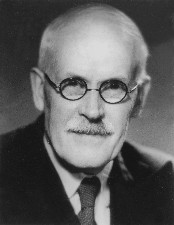A Quote by Harold Jeffreys
What the use of P [the significance level] implies, therefore, is that a hypothesis that may be true may be rejected because it has not predicted observable results that have not occurred.
Related Quotes
[Coining phrase "null hypothesis"] In relation to any experiment we may speak of this hypothesis as the "null hypothesis," and it should be noted that the null hypothesis is never proved or established, but is possibly disproved, in the course of experimentation. Every experiment may be said to exist only in order to give the facts a chance of disproving the null hypothesis.
Our assent to the hypothesis implies that it is held to be true of all particular instances. That these cases belong to past or to future times, that they have or have not already occurred, makes no difference in the applicability of the rule to them. Because the rule prevails, it includes all cases.
If one in twenty does not seem high enough odds, we may, if we prefer it, draw the line at one in fifty (the 2 per cent. point), or one in a hundred (the 1 per cent. point). Personally, the writer prefers to set a low standard of significance at the 5 per cent. point, and ignore entirely all results which fail to reach this level. A scientific fact should be regarded as experimentally established only if a properly designed experiment rarely fails to give this level of significance.
You may do as you wish without fear of retribution. It may serve you, however, to be aware of consequences. Consequences are results. Natural outcomes. These are not at all the same as retributions, or punishments. Outcomes are simply that. They are what results from the natural application of natural laws. They are that which occurs, quite predictably, as a consequence of what has occurred.
O Lord, may I never want to look good. O Jesus, may I always read it all: out loud and the very way it should be. May I never look at the other findings until I have come to my own true conclusions: May I care for the least of the young: and become aware of the one poem that each may have written; may I be aware of what each thing is, delighted with form, and wary of the false comparison; may I never use the word "brilliant."
We frequently fall into error and folly, not because the true principles of action are not known, but because for a time they are not remembered; he may, therefore, justly be numbered among the benefactors of mankind who contracts the great rules of life into short sentences that may early be impressed on the memory, and taught by frequent recollection to occur habitually to the mind.
All men are brothers, we like to say, half-wishing sometimes in secret it were not true. But perhaps it is true. And is the evolutionary line from protozoan to Spinoza any less certain? That also may be true. We are obliged, therefore, to spread the news, painful and bitter though it may be for some to hear, that all living things on earth are kindred.
Whenever a new finding is reported to the world people say - It is probably not true. Later on, when the reliability of a new finding has been fully confirmed, people say - OK, it may be true but it has no real significance. At last, when even the significance of the finding is obvious to everybody, people say - Well, it might have some significance, but the idea is not new.
I may not be funny. I may not be a singer. I may not be a damn seamstress. I may have diabetes. I may have really bad vision. I may have one leg. I may not know how to read. I may not know who the vice president is. I may technically be an alien of the state. I may have a Zune. I may not know Excel. I may be two 9-year-olds in a trench coat. I may not have full control of my bowels. I may drive a '94 Honda Civic. I may not “get” cameras. I may dye my hair with Hydrogen Peroxide. I may be afraid of trees. I may be on fire right now. But I'm a fierce queen.
One of the great fallacies of our time is that the Nazis rose to power because they imposed order on chaos. Precisely the opposite is true - they were successful because they imposed chaos on order. They tore up the commandments, they denied the super-ego, what you will. They said, "You may persecute the minority, you may kill, you may torture, you may couple and breed without love." They offered humanity all its great temptations. Nothing is true, everything is permitted.
But I should be very sorry if an interpretation founded on a most conjectural scientific hypothesis were to get fastened to the text in Genesis... The rate of change of scientific hypothesis is naturally much more rapid than that of Biblical interpretations, so that if an interpretation is founded on such an hypothesis, it may help to keep the hypothesis above ground long after it ought to be buried and forgotten.





































